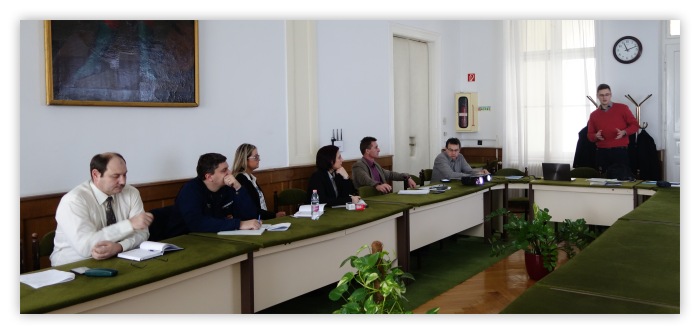The fourth stakeholder workshop within the Legal Accessibility project was held in the city of Nyíregyháza, at the County Hall (5 Hősök tere) to which stakeholders active in cross-border cooperation and relations in the Ukrainian-Hungarian border region were invited. In the form of a round table discussion, CESCI associates were collecting information on the legal obstacles, deficiencies and best practices experienced by local actors.
The meeting was held on the 9th of February 2016 and attended by 7 participants in the following sectors and fields:
- Labour and employment policy: Szabolcs-Szatmár-Bereg County Government Offices’ Head Department for Employment;
- Local government sector: City of Záhony, City of Kisvárda, Municipality of Szabolcs-Szatmár-Bereg County;
- Disaster management: Szabolcs-Szatmár-Bereg County Directorate for Disaster management;
- European groupings for territorial cooperation: Tisza EGTC;
- Education and training: Training Centre of Mátészalka.

The Ukrainian-Hungarian border region differs from border sections with EU member states with regard to both experience in cooperation and border crossing options. Formal cooperation and relations are still underdeveloped, and common development concepts have in many cases not yet reached the point of identifying specific obstacles.
The most pressing legal issue in the Ukrainian-Hungarian border area was related to border control. Recently, border crossing has become more difficult even for locals, as local border traffic has been closed. There is no appropriate infrastructure neither for daily commuting, nor for cross-border cooperation, both of which require predictable border crossing. Another obstacle in border control was mentioned, namely the fact that performers and artists from across the border cannot come to Hungary because it is complicated to get a visa. Stakeholders deem it necessary to explore the legal environment of acquiring ad hoc or group visa.
In the field of education and training, the fact that only students with a permanent Hungarian address are allowed to profit from free tuition was mentioned as a problem. Concerning training, the differences in legislation and the difficult harmonisation of professions in the two countries is a severe hindrance.
Cross-border relations in the field of disaster management are fairly weak. Consequently, consultations at a higher level would be necessary in both countries in order to reach adequate cooperation.
Cross-border relations in the field of disaster management are fairly weak. Consequently, consultations at a higher level would be necessary in both countries in order to reach adequate cooperation.
Participants of the workshop agreed that a unified accounting system would be necessary for common projects and tenders.